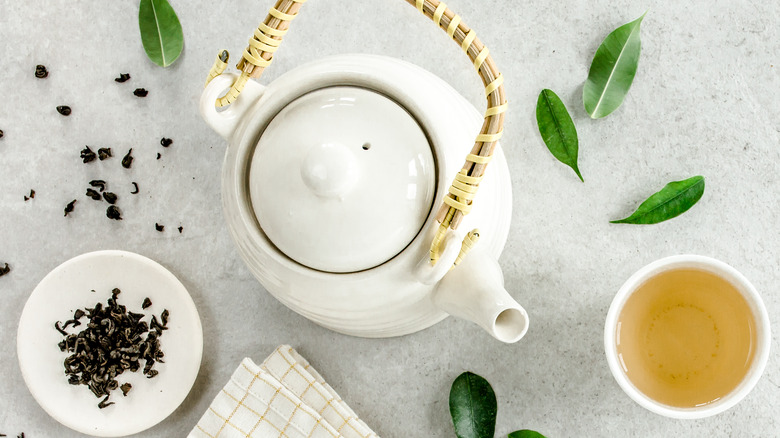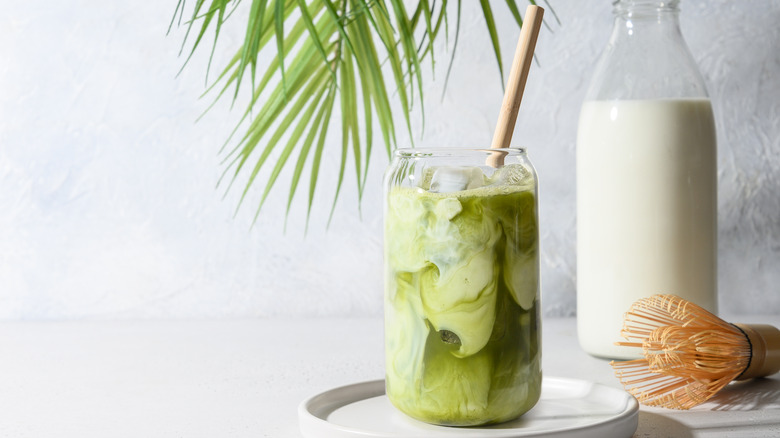Medications That Interact With Green Tea
From fruit-infused iced refreshers to matcha-flavored oatmeal, green tea is holding onto its place on the podium within the wellness sphere. A big component of the popularity of green tea is rooted in its benefits, which are numerous. Packed with antioxidants, this herbal drink has been found to improve brain health, aid in weight loss, and protect against cancer and heart disease, according to Healthline. Green tea may even help reduce bad breath since its natural components can suppress bacterial growth and improve oral hygiene. However, green tea may not be beneficial for everyone, especially those with certain medical conditions or prescribed medications that interact with the herbal elixir.
Green tea has a rich and extensive history. The leaves of the camellia sinensis plant, which create green tea, were used in medicine dating back to China's Han Dynasty between the years 206-220 (per Art of Tea). Later, in the seventh century, it began to be consumed as a recreational beverage, which has ultimately evolved into the variety of green tea products on the market today. Now, you can order an iced matcha latte from Starbucks or buy a bulk pack of green tea bags from your local grocery store — but how does this tea with such a long history interact with modern medications? Here is what you should know about the medications that can interact with green tea.
Be aware of caffeine
Since green tea contains caffeine, it's important to be mindful of medications that can alter your body's breakdown of caffeine, reports WebMD. In fact, medication interactions with green tea are predicated on the presence of caffeine. Cimetidine, fluvoxamine, verapamil, and disulfiram are all medications that can decrease how quickly the body breaks down caffeine. Medications containing estrogen can also decrease the rate at which caffeine is broken down in the body. You may even be surprised to learn that birth control pills and contraceptive medications can decrease the time it takes the body to break down caffeine, so simultaneously drinking green tea can increase caffeine-based side effects, such as jitteriness, fast heartbeat, and headaches.
Stimulants are another class of medications you'll want to be mindful of when it comes to consuming green tea, as caffeine itself is a stimulant (via WebMD). Taking stimulant-based medications and caffeine together can increase your heart rate and lead to serious heart problems. Medications that interact with the caffeine in green tea include ephedrine and medications that treat ADHD, such as Adderall and Ritalin. Recreational stimulants, like nicotine, should also be avoided alongside green tea. Be mindful of combining green tea with other caffeine-containing beverages, like coffee and soda, since too much caffeine can be dangerous to your overall health. On the flip side, if you're prescribed pentobarbital or another sedative for symptoms of insomnia, the caffeine in green tea can block the sleep-producing effects of these sleep aids.
Green tea can inhibit medications
Green tea can prevent several medications from working correctly (per WebMD). Green tea can decrease the body's ability to break down some medications, thus increasing the possibility of experiencing side effects. These medications include riluzole, clozapine, nadolol, atorvastatin (Lipitor), and lithium. If taking medications meant to slow blood clotting, such as anticoagulants or antiplatelet prescriptions, there is an increased risk of bruising and bleeding if green tea is consumed.
The combination of green tea with some medications may negatively impact liver health (via Drugs.com). Simvastatin and rosuvastatin (Crestor) are medications usually prescribed to lower cholesterol, but when taken alongside green tea or green tea extracts, the combination can lead to potential liver damage. This is because green tea can increase the amount of these medications in the blood. Simvastatin, rosuvastatin, and other medications that could impact the liver, as well as recreational alcohol, should be avoided alongside green tea — there is a risk of developing toxicity of the liver (via WebMD). If you have concerns about how any of your medications may interact with green tea, always consult with your healthcare provider.



